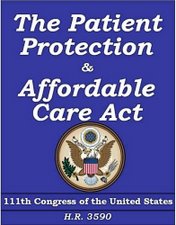Effects – General « Affordable Care Act – Health Care Reform Act (2010)

Healthcare Reform Act of 2010
(the "Affordable Care Act")
General Coverage and Effects
Articles and Publications
 Upheld by the Supreme Court – June 28, 2012
Upheld by the Supreme Court – June 28, 2012
National Federation of Independent Business et al v. Sebeluis, Secretary of State and Human Services, et al
-
Ruling of the Supreme Court – 6/28/12
In 2010, Congress enacted the Patient Protection and Affordable Care Act in order to increase the number of Americans covered by health insurance and decrease the cost of health care. One key provision isthe individual mandate, which requires most Americans to maintain“minimum essential” health insurance coverage. Another key provision of the Act is the Medicaid expansion.Twenty-six States, several individuals, and the National Federation of Independent Business brought suit in Federal District Court,challenging the constitutionality of the individual mandate and the Medicaid expansion.
The Court of Appeals for the Eleventh Circuit upheld the Medicaid expansion as a valid exercise of Congress’s spending power, but concluded that Congress lacked authority to enact the individual mandate. Finding the mandate severable from theAct’s other provisions, the Eleventh Circuit left the rest of the Act intact.
Held: The judgment is affirmed in part and reversed in part.
- Supreme Court on Health Care Law: How they Voted, What They Wrote (CNN – 6/28/12)
Chief Justice John Roberts wrote the majority opinion. He was joined by Justices Sonia Sotomayor, Stephen Breyer, Ruth Bader Ginsburg and Elena Kagan. Those in the dissent included Justices Anthony Kennedy, Samuel Alito, Antonin Scalia and Clarence Thomas.
Effects of Healthcare Reform Act – General
- 10 Things You Get Now That Obamacare Survived (Mother Jones – 6/28/12)
The US Supreme Court on Thursday largely upheld the Patient Protection and Affordable Care Act, the centerpiece of President Obama's first term in office. Chief Justice John Roberts, a conservative appointed by George W. Bush, joined with the high court's four liberals and penned the majority opinion. In their dissent, the court's four other conservative justices said they would have struck down the entire law. So what does the court's ruling mean for regular Americans? - Consumers Guide to Health Reform (Kaiser Health News) 4-13-10
The new health reform law is the most far-reaching health legislation since the creation of the Medicare and Medicaid programs. Here is a look at the impact of the law, which will extend insurance coverage to 32 million additional Americans by 2019, but which will also have an effect on almost every citizen. - Everything You Want to Know About the Health Care Law (Politifact.com – 3/23/12)
The health care law turns 2 years old this week, and polls show the public still has a hard time understanding what's in the law. We can understand the confusion: Many of the law’s most biggest features don’t kick in until 2014 and the falsehoods about the law have often drowned out the truths. - How The Health Law Could Play Into Consumers' Decisions During Open Enrollment Season (Kaiser Health News – 10/8/12)
While health care is still a hot issue in the election, in the coming months consumers will be facing a health insurance decision of their own: open enrollment. That’s the period, usually in the last quarter of the year, when workers with insurance can change coverage options without having to prove their health status. While the majority of provisions in the Obama administration’s Affordable Care Act (ACA) don’t take hold until 2014, a handful have already been rolled out and more will be implemented in 2013. For employees, their companies, and insurers, the law means new choices and responsibilities in the upcoming open enrollment period. See “Open Enrollment and Obamacare: What You Need to Know.” - Implementing Health Reform: Employer and Consumer Issues (Alliance for Health Reform – Dec. 2010)
The new Patient Protection and Affordable Care Act (PPACA, or, more concisely, ACA) contains a smorgasbord of provisions affecting how employers offer health coverage, and how consumers buy coverage. - Implications of Health Reform for Mental Health Care (Psychiatric Services – 5/10)
Provisions in the Patient Protection and Affordable Care Act signed into law by President Obama on March 23 will benefit people who have mental and substance use disorders and their families, improve care in the public mental health system, and address the mental health workforce crisis. - The New Health Care Law and Denial of Claims (AARP – 11/8/10)
Answers the question: "If my health insurance company denies my claim, does the health care reform law make it easier to fight that decision?" - The New Health Care Law and "Grandfathered" or Exempt Plans (AARP – 9/4/10)
Answers the question: "What does it mean if my health plan is "grandfathered" under the new health care reform law?" - The Uninsured: A Primer (Kaiser Family Foundation – Dec. 2010)
An updated primer from the Kaiser Family Foundation reviews the basic profile of the uninsured population, how they receive care, the latest trends in health insurance coverage, and how this population may be affected by health reform.
Articles About Healthcare Reform Act
- 11 facts about the Affordable Care Act (Washington Post – 6/24/12)
Polling shows the law remains unpopular even as its component parts — with the notable exception of the individual mandate — are very popular. So here’s a refresher on some of the law’s most significant policies and consequences. - AARP Responds to Supreme Court Ruling on the Affordable Care Act (AARP Press Release – 6/28/12)
AARP is pleased that the Supreme Court found the critically important provisions of the Affordable Care Act (ACA) to be constitutional. This landmark legislation is already improving the health and financial security of our members and all Americans. We are analyzing the entire decision, including the Medicaid portion of the Supreme Court’s decision, to understand what it means for affordable healthcare coverage moving forward. - Implementation and the Legacy of Health Care Reform (New England Journal of Medicine)
The stakeholders in Washington, D.C., know all too well that the players who will wield the most influence over how the law’s reforms are integrated into the nation’s health care system do not reside in the Capitol Building. The new power brokers will be housed in the White House, the Office of Management and Budget, and myriad federal departments and agencies – particularly the Department of Health and Human Services, which will administer the bulk of the new act’s phased-in provisions. - The Flood of Falsehoods About the Health Care Law (PolitiFact.com – 3/21/12)
The Affordable Care Act, the Democrats' health care law, has often been defined more by falsehoods than truths. Claims that the law is a "government takeover of health care," that it contains "death panels" and that it will put a 3.8 percent tax on home sales have frequently drowned out true claims about what the law actually does. - Who's the Boss? (The Michigan Lawyer)
Gov. Jennifer Granholm, in a sternly worded, hand-delivered letter, has told Attorney General Mike Cox to back off on participating in a Florida lawsuit challenging the federal health care reform bill signed into law earlier this week.
Publications re: Effects of Healthcare Reform Act
- Explaining Health Care Reform: Questions About The Extension of Dependent Coverage to Age 26 (Kaiser Family Foundation)
This short summary answers basic questions about the dependent coverage expansion and explains how the new law will interact with current state laws. - Explaining Health Care Reform: Questions About The Temporary High-Risk Pool (Kaiser Family Foundation)
The health reform law creates a temporary national high-risk pool that will be created under the new health reform law to provide health coverage to people with pre-existing medical conditions who have been uninsured for six months. It is a temporary measure designed to bridge the gap until the implementation of other coverage provisions in the law that will take effect in January 2014. The law establishes basic requirements for the high-risk pool program that will be implemented in June 2010. This summary provides answers to basic questions about the the program. - How the New Health Care Law Benefits You (AARP)
Congress enacted a new health care law which brings a number of benefits to all Americans, including people over 50. Whether you are on Medicare, buy insurance on your own or through your employer, or can't afford health insurance, the changes to the health care system will affect you. - Summary of New Health Reform Law (Kaiser Family Foundation)
Summary of the new law, and changes made to the law by subsequent legislation, focuses on provisions to expand coverage, control health care costs, and improve health care delivery system.
All PEKD Advocacy pages About Healthcare Reform Act:
- Affordable Care Act – Official Information
- Effects – Elderly/Disabled
- Effects – General
- Effects – Medicaid/Medicare

